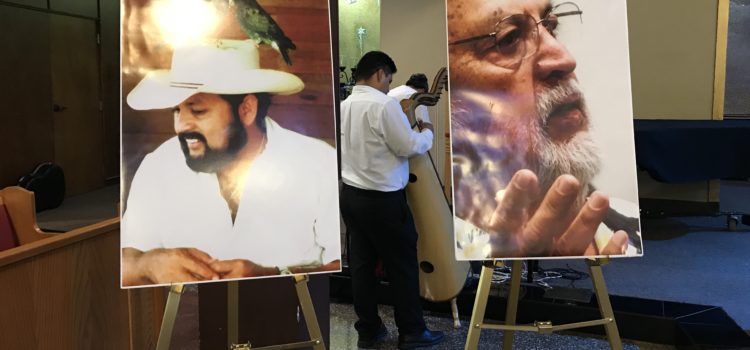
Before he passed, Raymond Gonzales had one request for his memorial service: that his loved ones tell the truth and speak from the heart, and that’s exactly what they did Friday morning.
People of all walks of life, including educators, politicians and advocates, filled the pews at St. Francis of Assisi Parish to recognize his life work and to pay their respects to the scholar, diplomat, pioneer, coalition builder, mentor and community hero.
Those closest to Gonzales spoke of his hard work and dedication to his community. He advocated for change throughout his life as Kern County’s first Chicano state assemblyman, a U.S. diplomat, a founding member of the Latino civil rights movement, a U.S. marine, a Bakersfield College professor, and school board trustee — his proudest role throughout a lifetime of impressive public service positions.
“He learned to value faith, family and community and our democracy,” said long-time educator Steve Arvisu, who eulogized Gonzales’ life. “He applied his learnings for the common good. He stood up for those who needed a helping hand and who needed fairness in their lives,” Arvisu said.
Gonzales died Sept. 5 after battling kidney failure for several years, according to family members. He was 80.
Those touched by Gonzales’ work agree the “Godfather of Bakersfield Chicano Movement” has left a legacy in Kern County, with a passion to better his community.
“He was a coalition builder,” said Oliver Rosales, a BC history professor. “He was involved in so many facets of civil rights — from school segregation, to women’s rights, to running for political office. He really laid the groundwork for a lot of the social justice activism that you see today.”
There are many lessons to be learned from Gonzales’ work, City Councilman Andrae Gonzales said, but there are three lessons that stuck with Andrae, who served with Raymond on the Bakersfield City School District board of trustees.
First, Raymond believed in building bridges. He knew politics could be divisive, but he believed true politics involved people coming together.
Second, he believed partaking in an elected office — which Ray considered sacred work — is a public service. He believed in term limits and thought it was important to hear new voices and new perspectives.
And third, but not least, Raymond believed relationships matter most in life.
“He made our community a better place,” Andrae said.
One lesson, however, that Raymond exemplified best was doing what was right. He was a dedicated public servant.
“He voted to do what was right — not what was popular,” said Kern County Superior Court Judge Louis Vega.
Raymond never compromised his values, said Octavio Barajas, a BC history professor. He would not allow government to alter or influence his values. He famously spurned donations from lobbyists and returned their checks during his tenure in the state assembly.
“I really look up to him for that reason,” said Barajas.
Setting aside the politics, education and activism, Gonzales always knew God was with him, said Monsignor Father Craig.
“His greatest accomplishment was he was a man of God,” Craig said. “God chose Ray to not only teach in the classroom, but to teach life.”